
|
Warning!
At least some content in this article is derived from information featured in Fantastic Beasts and Where to Find Them (film). As such, spoilers will be present within the article. |
- "A law that has us scuttling like rats in the gutter. A law that demands that we conceal our true nature. A law that directs those under its dominion to cower in fear, lest we risk discovery. I ask you, Madam President, I ask all of you — who does this law protect? Us, or them? I refuse to bow down any longer."
- — Gellert Grindelwald[src]
Gellert Grindelwald (c. 1883 – March, 1998) was considered to be the second most dangerous Dark Wizard of all time, after Tom Riddle. A student at Durmstrang Institute, Grindelwald was expelled for twisted, dark experiments and near-fatal attacks on his fellow students. He later fostered a friendship with a young Albus Dumbledore, making plans to find the Deathly Hallows and lead a Wizarding revolution to end the International Statute of Secrecy, creating a benevolent global hierarchical order led by wise and powerful witches and wizards that dominated Muggles. Their partnership fell apart after the two were involved in a three-way duel with Aberforth Dumbledore that resulted in the death of Ariana Dumbledore. Grindelwald left Britain and later stole the Elder Wand from Mykew Gregorovitch, proceeding alone with the revolution he and Dumbledore had planned.
Grindelwald was a complex figure, highly idealistic and talented, dedicated to achieve his ends at any cost. A revolutionary operating outside the law, he and his followers committed numerous crimes, including several known murders. With violent acts in both the United States and Europe, he ultimately established a power base in continental Europe at the fortress Nurmengard. In 1945, at the height of his power, Dumbledore confronted and defeated him in a legendary duel. He was subsequently imprisoned in his own fortress for decades and was slain there by Voldemort in 1998 when he refused to give up information on the location of the Elder Wand.
Quick Answers

Who is the character Gellert Grindelwald in the Harry Potter series?

What is the relationship between Grindelwald and Dumbledore?

What role does Grindelwald play in the Fantastic Beasts series?

What happened to Grindelwald in the Harry Potter series?

How does the character of Grindelwald evolve from his younger years to his older years?

Biography
Early life
- "Educated at Durmstrang, a school famous even then for its unfortunate tolerance of the Dark Arts, Grindelwald showed himself quite as precociously brilliant as Dumbledore. Rather than channel his abilities into the attainment of awards and prizes, however, Gellert Grindelwald devoted himself to other pursuits. When Grindelwald was sixteen years old, even Durmstrang felt it could no longer turn a blind eye to his twisted experiments and he was expelled."
- — The Life and Lies of Albus Dumbledore describing Grindelwald's school days[src]
Grindelwald with his wand during his teenage years
Gellert Grindelwald was born around 1883.[1] He was educated at Durmstrang Institute, where he excelled in various fields of magic and absorbed much of the strength-obsessed, Dark Magic-oriented school culture. He was an extremely talented wizard, who possessed an attractive and winsome personality, which was coupled with a "merry, wild" disposition. Grindelwald instantly felt the attraction of the Dark Arts.
Keenly interested in history, lore, and the powerful mystique of magical artefacts Grindelwald became fascinated with the Deathly Hallows. He became fascinated to the point of appropriating their runic symbol as his own personal emblem and engraving it on the walls of Durmstrang prior to his departure. These engravings persisted for many generations. Dumbledore noted to Harry Potter that 'twisted experiments' had been the reason for his expulsion at 16 years old from Durmstrang before graduating. This was an ominous and troubling sign, as it meant that Grindelwald performed experiments that were too disturbing even for a school of the Dark Arts.
Friendship with Dumbledore
- "Grindelwald. You cannot imagine how his ideas caught me, Harry, inflamed me. Muggles forced into subservience. We wizards triumphant. Grindelwald and I, the glorious young leaders of the revolution. Oh, I had a few scruples. I assuaged my conscience with empty words. It would all be for the greater good, and any harm done would be repaid a hundredfold in benefits for wizards. Did I know, in my heart of hearts, what Gellert Grindelwald was? I think I did, but I closed my eyes."
- — Dumbledore recounting his relationship with Gellert[src]
After expulsion, Gellert's quest for power and information about the Hallows led him to Godric's Hollow, England, where Ignotus Peverell, said to have been the first owner of Death's Cloak of Invisibility, had been laid to rest. Conveniently, his great-aunt, acclaimed wizarding historian Bathilda Bagshot, lived there and provided a place for him to stay, complete with a treasure trove of books and documents and a minimum of supervision. It was in Godric's Hollow in the summer of 1899 that Grindelwald met and befriended Albus Dumbledore.[7] The two teenagers had a lot in common: they were intellectuals and top-of-the-class talented young wizards who were idealistic and ambitious. It is clear that the pair were very close and the friendship was genuine on both sides. They shaped one another's ideas, powers, as well as destinies from that day forth.

Gellert Grindelwald with his friend Albus Dumbledore in 1899
The pair shared two preoccupations: The search for the Deathly Hallows held their fascination with the goal of acquiring all three and wield the power of Master of Death Which they believed to mean immortality and invincibility. They also dreamed of overturning the Statute of Secrecy and creating a new order in which wise and powerful wizards and witches were the benevolent overlords of their world, including Muggles. Dumbledore coined the phrase "For the Greater Good" that would be used to justify the necessary use of force required to achieve their goals, and Grindelwald would later adopt as his slogan.[8]
However, Dumbledore's motivations and intentions were different from Grindelwald's: as a young man, Dumbledore had witnessed and been powerless to stop a group of Muggle boys tormenting his younger sister, Ariana, to the point that the sweet-natured girl suffered an emotional breakdown and her repressed magic became dangerously unstable. Dumbledore's father was sent to Azkaban for taking revenge on the Muggle boys and his mother was killed in one of Ariana's accidents. He wanted the power to protect his loved ones (and by extension the whole world) against cruelty and xenophobia like that shown by the Muggles. He viewed the Resurrection Stone as a way of returning his parents to life and relieving him of his new familial obligations, while Grindelwald mistakenly viewed it as a tool to amass an army of inferi.[9]
The friends' plans to leave Godric's Hollow, acquire power, and begin their revolution turned serious in the summer of 1899. When Dumbledore's brother Aberforth became aware of this he was disgusted with Albus's ambition, but was concerned about it as well, knowing that he and Ariana would need to be brought along as she would not receive the care and attention she needed to keep her stable. The tense situation boiled over into a confrontation and Grindelwald, enraged, inflicted the Cruciatus Curse on Aberforth. Albus moved to defend his brother, igniting a vicious three-way duel in which Ariana was killed. Aberforth and Albus were devastated. Grindelwald fled the country and received putative blame for Ariana's death, thus confirming his place on the wrong side of the law and touching off his career as a Dark revolutionary, which would last until 1945.
Rise to power
- "It was stolen from me... it was a boy, it was he who took it. I never saw it again."
- — Gregorovitch to Lord Voldemort on Grindelwald's theft[src]

Grindelwald gains possession of the Elder Wand by stealing it from wandmaker Mykew Gregorovitch
Grindelwald delved into his research on the Deathly Hallows and uncovered the location of the Elder Wand. Rumours had been circulating that the renowned wandmaker Gregorovitch had the wand and was trying to duplicate its properties. Grindelwald broke into Gregorovitch's workshop, lay in wait for the wandmaker, stunned him, and stole the wand, thereby becoming its new master. Grindelwald's research may have uncovered this unconventional path to ownership of the wand as the common interpretation was that ownership passed only by murder.[10][11]
International wizardhunt
- "I will not be lectured by the man who let Gellert Grindelwald slip through his fingers!"
- — Seraphina Picquery to Heinrich Eberstadt[src]

Grindelwald evades capture
Following his acquisition of the Elder Wand, Grindelwald began amassing an army of followers. Eventually he and his legions of "fanatics" launched several devastating attacks across Europe, committing mass-slaughter, and garnering international attention from wizarding authorities. Several of the attacks also drew the attention of the Muggle world, risking exposure and war. In response to Grindelwald's actions, an international wizardhunt ensued and was reported on in periodicals such as the Daily Prophet and the The New York Ghost.[12]
At some point, Grindelwald was almost captured but was able to evade his pursuers, and disappear. Magical Congress of the United States of America President Seraphina Picquery would later lay the blame for Grindelwald's escape on Heinrich Eberstadt, claiming that he had let the dark wizard "slip through his fingers".[6]
Impersonating Percival Graves
- "We've lived in the shadows for far too long."
- — Gellert Grindelwald to Credence Barebone[src]
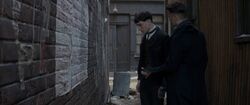
Grindelwald adopted the identity of Percival Graves and befriends Credence Barebone in order to find the Obscurial
Unbeknownst to Picquery, Grindelwald had already infiltrated MACUSA by assuming the identity of her right-hand man Percival Graves, who Grindelwald managed to subdue. Grindelwald believed the mysterious attacks occurring in New York City to be the work of a powerful Obscurial, which he felt would be a great asset for his plans of world domination. Using his disguise as Graves, Grindelwald came into regular contact with Credence Barebone. He believed Credence to be connected to the Obscurial due to a vision he received. Believing Credence was an orphaned Squib, Grindelwald emotionally manipulated him into helping him find the Obscurial. He did this with the promise of protecting him from his abusive adoptive mother and teaching him magic.
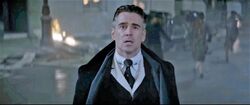
During this time, Grindelwald (as Graves) arrested Newt Scamander, whose escaped beasts were believed by the MACUSA to be the cause of the Obscurial's attacks. During his interrogation, Grindelwald discovered the Obscurus within Newt's suitcase, and in an effort to hide his tracks, had him and Tina Goldstein sentenced to death. Afterwards, he approached Credence after Mary Lou Barebone was killed by the Obscurial and had him track down his adoptive sister Modesty Barebone, believing her to be the source of the Obscurus. Once they found Modesty, Grindelwald cruelly rejected Credence, as he had no further use of him. This angered Credence, who then revealed that he was the Obscurial, much to Grindelwald's surprise. Grindelwald wanted to use him to expose the North American wizarding community, and create a weapon against Dumbledore. He attempted to convince Credence that he had nothing to fear anymore and to join his ranks, but this further angered Credence who began rampaging through the city. Grindelwald was not easily deterred, however, and continued to try to recruit Credence, clashing with Tina and later Newt, both of whom he easily overpowered. When Grindelwald, Newt, and Tina were finally close to calming down Credence, President Picquery and her other Aurors appeared on the scene, and she orders them to attack the Obscurus. Acting on her orders they did as they were told and opened fire.
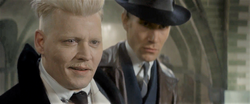
Grindelwald is unmasked by Newt Scamander, and apprehended by the MACUSA
With Credence being seemingly destroyed at the Aurors' hands, Grindelwald was so beside himself with rage, that he, lead by his extreme idealism, began to break his disguise, expressing his utter disgust for being forced to hide from the No-Majs. Picquery subsequently ordered the other Aurors to bring "Percival Graves" in, but Grindelwald, no longer suppressing his tremendous magical prowess, easily fended off all of the Aurors simultaneously (much to the President's shock and dismay), and soon started to overwhelm them, bringing the Aurors down one after the other, until Newt finally managed to catch him off-guard with his Swooping Evil and restrained Grindelwald's hands from behind, while Tina used a Summoning Charm to take Graves' wand. Newt casted the Revelio Charm, making Grindelwald's disguise fade away, revealing his true face. Even apprehended, Grindelwald was unfazed, arrogantly questioning President Picquery's ability to contain a wizard of his reputation and power. As he was lead away, Grindelwald met Newt's gaze and mysteriously asked him: "Will we die, just a little?"
Grindelwald dramatically escaped the MACUSA a few months later.[13] At some point, he established a prison, Nurmengard, to serve as a form of containment for his enemies.
Fall from power and imprisonment
- "...while I busied myself with the training of young wizards, Grindelwald was raising an army. They say he feared me, and perhaps he did, but less, I think, than I feared him... It was the truth I feared. You see, I never knew which of us, in that last, horrific fight, had actually cast the curse that killed my sister... I think he knew it, I think he knew what frightened me. I delayed meeting him until finally, it would have been too shameful to resist any longer. People were dying and he seemed unstoppable, and I had to do what I could."
- — Description of Gellert's reign[src]

Grindelwald in Nurmengard
Albus Dumbledore hesitated to confront Grindelwald, despite the belief held by many, including quite possibly both men themselves, that he was the only wizard skilful enough to stop his former friend. The reason Dumbledore himself gave Harry was that he was afraid Grindelwald knew better than he did who exactly was responsible for killing Ariana and he didn't want to find out. But Dumbledore, at this point about 63 years old and Head of Transfiguration at Hogwarts, was finally importuned by people who suffered from his former friend's actions to move against him and tracked down Grindelwald. Upon being found by Dumbledore, they engage in a duel of such legendary proportions that eyewitnesses stated that it was the greatest duel ever fought between wizards. Altough Grindelwald put up an immense fight, despite Grindelwald's mastery of the Elder Wand, Dumbledore had ultimately triumphed over Grindelwald due to being, in his own admission, a "shade more skillful", becoming the master of the Elder Wand, and brought him to the authorities of the magical world, resulting in Grindelwald being imprisoned in the topmost cell of Nurmengard.[11]
Death
- "Kill me, then. Voldemort, I welcome death! But my death will not bring you what you seek… that wand will never, ever be yours!"
- — Grindelwald shortly before his death[src]
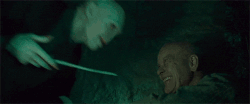
Grindelwald is murdered in his cell at the hands of Lord Voldemort
Fifty-three years after his defeat, Grindelwald was slain in his prison cell by Voldemort, who was searching for the Elder Wand for himself. It was only during the confrontation in Grindelwald's cell that Voldemort learned Albus Dumbledore had claimed the wand long ago. Grindelwald showed no fear during this confrontation, taunting Voldemort by name and laughing at his desire for the wand. Voldemort ended Grindelwald's life with the Killing Curse in the spring of 1998.[14]
Physical appearance

Gellert Grindelwald as a young man
As a young man, Grindelwald had golden blond hair and a "merry, wild" and “handsome” face. Harry Potter thought he had "a Fred and George-ish air of triumphant trickery about him".[15]
While he was middle aged, Grindelwald's hair was blond and he was blue-eyed.[4] He also had a thin white moustache.[3]
Near the end of his life, when Voldemort found him at the top of Nurmengard, Grindelwald was severely emaciated - a frail skeletal figure with a skull-like face, great sunken eyes, wrinkled cheeks, and most of his teeth were gone.
Personality and traits
- "They say he showed remorse in later years, alone in his cell at Nurmengard. I hope that is true. I would like to think that he did feel the horror and shame of what he had done. Perhaps that lie to Voldemort was his attempt to make amends... to prevent Voldemort from taking the Hallow..."
- — Dumbledore discussing Grindelwald after his death[src]
Grindelwald was charming, driven, charismatic and brilliant as a young wizard, and most who encountered him considered him so - Albus Dumbledore himself confessed that Grindelwald was extremely charming, so much that it had induced him to fall in love with him, and it was partly the reason Dumbledore had been initially blind to just how dangerous Grindelwald truly was. His attraction to the Dark Arts was not necessarily malevolent in its initial stages,[16] but was more of a personal interest that swelled over time in Durmstrang, a school that as good as encouraged interest in the Dark Arts. He was highly intelligent, magically talented, idealistic, as well as ambitious to the point of ruthlessness, with a vicious temper: when Aberforth Dumbledore challenged his and Albus's plans and tried to convince his brother to abandon them, Grindelwald "lost control" and used the Cruciatus Curse on Aberforth showing his willingness to cause pain to people who challenged him.[11] Later when Grindelwald duelled Newt Scamander he swiftly overpowered his opponent but opted to incapacitate him through bolts of lightning from the tip of his wand as a manner of torture as opposed to killing him outright. Dumbledore himself expressed horror in what Grindelwald truly was, stating that he had always (unconsciously) sensed something dangerous in him.
Although Grindelwald was arrogant and self-centred, he was able to recognise talent in others and form (or pretend to form) close human connections. He demonstrated manipulative skills and the willingness to use them for his own purposes. Judging by Aberforth's testimony, he had little interest in, or patience with, those he considered beneath him. He considered Albus Dumbledore an equal and praised the tremendous potential of the Obscurial Credence Barebone, for instance, but was dismissive of the less talented and intelligent Aberforth, the permanently damaged Ariana, and also, initially, Credence, whom Grindelwald initially callously discarded when he seemingly became no longer useful, mistakenly believing Credence to be a Squib, whom it would be impossible to magically train. In addition, while disguised as Percival Graves, Grindelwald questioned Newt Scamander in an interrogation as to why Dumbledore would have such faith in Newt, indicating an interest in further understanding both Dumbledore and Newt's abilities. Grindelwald's dismissal of Credence as a Squib suggested that either Grindelwald had a weakness for jumping to conclusions, or a weakness of arrogantly discarding something without remorse if it proved useless for his intentions.
In addition to being a fierce elitist, Grindelwald possessed a genius-level intellect and a ruthless streak. Aside from his ability to create carefully-woven plans to achieve his goals, he was able to mimic the personality of Percival Graves for some time without arousing suspicion - the only time he truly aroused anyone's suspicion was when he interrogated Newton Scamander and labelled the Obscurial as 'useless', which provoked the curiosity of Scamander. Thus, Grindelwald either lapsed in his facade at this point, or incorporated his own ruthlessness and calculative nature into that of Percival Graves. However, other than this, Grindelwald showed himself to be a master manipulator - he effortlessly exploited Credence by appealing to the boy in a way nobody else tried to and offering to accept the boy into his ranks. Even after it became clear that Credence, as an Obscurial, was extremely powerful and phenomenally dangerous, Grindelwald calmly continued to try and exploit him, and was outraged when the MACUSA President opted to have her Aurors seemingly destroy him. Grindelwald was idealistic to an extreme[17], having absolutely no complaints about the murder of hundreds of innocent people as long as that accomplished his long-term goals. Indeed, Grindelwald's idealism even prompted him to truly break his disguise in New York, expressing his disgust for being forced to hide from Muggles, and then proceeding to attack the MACUSA Aurors who had seemingly killed Credence. Even when apprehended by Newt Scamander, Grindelwald was unfazed, arrogantly questioning President Picquery's ability to contain a wizard of his reputation and power.
His actions did have limits, His decision to stun, not kill Gregorovitch, when he acquired the Elder Wand from the latter, which hints at a willingness not to kill simply as a matter of course. However, this might have been a calculated decision, perhaps considering that people were more likely to give credence to Gregorovitch's claims that he'd had the Elder Wand if he was murdered, as that was the traditional method of passing it on.[16] Also, part of his motivation for refusing to give Voldemort any information about the Elder Wand may have been a desire to prevent Dumbledore's tomb from being desecrated, or even out of remorse for his own crimes. Alternatively, he may have merely wanted to taunt Voldemort, though Harry Potter and Dumbledore himself both suspect the former two reasons to be more likely.[11] Grindelwald is also proven to be capable of fear judging from the fact that he fled in fear of his life after the intense duel between himself, Dumbledore, and Aberforth that resulted in Ariana's death, and how he resorted to being more cautious around Credence upon realising that he was the Obscurial (in the knowledge of how dangerous and volatile Obscurials were), and never attempting to extend his power to Britain for fear of facing Dumbledore (most likely due to the circumstances of their last encounter, and the fact that he recognised how powerful Dumbledore was). Not only does this suggest that Grindelwald was actually capable of contemplating somebody being more powerful or dangerous than him, but that he was capable of respecting Dumbledore in his fear of him.
Grindelwald may have regained some perspective after his downfall, apparently expressing remorse for his crimes late in his life. When trapped and unarmed, Grindelwald faced certain death at the hands of the only Dark Wizard to ever be considered possibly more powerful and dangerous than himself, he was openly defiant and even mocking, goading Voldemort into killing him saying he welcomed death but that it would not bring him what he seeks and saying there is so much he doesn't understand. Indeed, he seemed to exhibit a grotesque remnant of the "merry, wild" temperament of his youth. His last words consisted of the dressing-down of Voldemort and a rather enthusiastic outlook on "the next great adventure" seems clear in its connection to his old friend, Albus Dumbledore.
Magical abilities and skills

Grindelwald (disguised as Percival Graves) fights off several MACUSA Auror at once
- "In a list of Most Dangerous Dark Wizards of All Time, he'd miss out on the top spot only because You-Know-Who arrived, a generation later, to steal his crown."
- — The Life and Lies of Albus Dumbledore on Gellert's reputation and power[src]
Grindelwald was outstandingly talented even while still a student at Durmstrang, though he did not, like Dumbledore, channel his abilities into attaining awards and prizes. As an adult, Grindelwald became an exceptionally powerful and accomplished wizard, considered to be the most powerful and dangerous dark wizard of all time (arguably being rivaled, if not, surpassed only by Lord Voldemort a generation later in Britain), feared by most of the wizarding world during his reign of terror. As a former master of the Elder Wand, Grindelwald's already formidable magic was further enhanced by the artefact's legendary powers, allowing him to perform extraordinarily powerful spells that would normally be magically impossible to perform. Even while utilising Percival Graves's wand to maintain a disguise (with it being unclear whether or not he had properly won said wand), Grindelwald was still extremely powerful and dangerous, performing feats that required immense magical power.
- Magical Mastery: Grindelwald was noted to be extremely talented and prodigiously skilled while still a student of Durmstrang Institute, and his magical mastery was considered to match that of Albus Dumbledore, which induced the two young men to quickly befriend one another in their youth. As an adult, Grindelwald was considered to be the most powerful Dark Wizard of all time, with even Britain, who had never experienced him due to Dumbledore's protection, holding the same opinion until Lord Voldemort rose to power in the country, and with the Elder Wand enhancing his already tremendous ability, Grindelwald successfully terrorised much of wizarding world, defeating so many in his reign of terror that Dumbledore eventually was deemed the only wizard who could possibly stand any chance of defeating Grindelwald. In the end, Grindelwald's power proved to be great enough that Dumbledore, despite his strong desire not to engage Grindelwald, was eventually forced to take action. While he was ultimately defeated by his old friend in a duel of legendary proportions, it must be noted that Dumbledore at his prime was unable to prevail without extreme effort and would later admit that he had been only "a shade more skillful" than Grindelwald.
- Intellectual genius: Grindelwald was not only a great wizard, but also possessed an incredible intellect, as he was considered to be equally brilliant to Albus Dumbledore, who was himself considered the most brilliant student at Hogwarts up until that point when both of them were seventeen. Indeed, Grindelwald and Dumbledore's intellects were so complementary to one another, that, according to Bathilda Bagshot, even after spending an entire day in intellectually stimulating discussions with Grindelwald, Dumbledore would still unexpectedly send Grindelwald messages by owl right after sudden ideas struck him, with him having to let Grindelwald know of them immediately.[16] As an adult, aside from his ability to create complex and carefully-woven plans to achieve his goals, such as subtly apprehending President Picquery's right-hand man Percival Graves and infiltrating the MACUSA by assuming his identity, Grindelwald was able to perfectly mimic the personality and American accent of Percival Graves, and convincingly carry out his many duties as an Auror, the Head of MACUSA's Department of Magical Law Enforcement, and the Director of Magical Security, while also gradually managing to locate the rampaging Obscurial, all without arousing suspicion.
- Charisma: Even as a young man, Grindelwald was highly talented in manipulating others, such that he was able to manipulate the extremely intelligent Albus Dumbledore into agreeing to his ideas of revolution and only Aberforth's timely intervention stopped Albus. As an adult, his skills in manipulating grew even further, with Theseus Scamander describing him as a "charismatic blighter" and Grindelwald succesfully convincing many wizards and witches to join his cause. He was also able to effortlessly manipulate Credence Barebone into trusting him by looking as a kind mentor to him, to the point that Credence was conpletely unaware that Grindelwald was merely using him. He was also shown to be confident that he could eventually get Credence in his Obscurus form to listen to him, which made him enraged when he was seemingly destroyed by MACUSA Aurors.
- Dark Arts: Grindelwald was exceptionally talented in the Dark Arts and possessed a passion for it even from a young age. Even when he was still only a student of Durmstrang, Grindelwald's experiments in the Dark Arts were already very dangerous, even nearly fatal to the fellow Durmstrang students he attacked; eventually his "twisted experiments" became too dangerous for even Dumstrang's tolerant outlook on the Dark Arts, resulting in his expulsion.[16] While seventeen, Grindelwald was already adept at casting the extremely powerful Cruciatus Curse, which was one of the three Unforgivable Curses and required a considerable level of magic, notably using it against Aberforth Dumbledore.[18] By the time he became an adult, Grindelwald was widely considered to be the most powerful Dark Arts practitioner in history, with possibly only Voldemort rivalling, if not, surpassing him, having perfected many aspects of the Dark Arts and created his own dark spells. While impersonating Percival Graves, Grindelwald displayed the abillity to cast a curse that emitted a bolt of lightning that inflicted deep pain on those who were hit by it, which he used to torture Newt Scamander.
- Duelling: Gellert Grindelwald was a duellist of almost unrivalled skill. Having received thorough training in duelling and martial magic during his schooling at Durmstrang, Grindelwald was able to hone his skills to match his extraordinary high potential, becoming a fully confident, focused, disciplined and versatile master of combative sorcery, his reactions "marvelous, astounding". Though quite capable of performing magic of immense and destructive power as seen in how he made short work of the five European Aurors who were searching for him, he generally seems to prefer to engage his adversaries in a more traditional and formal manner and defeat his foes in a more "fair fight", showing a surprisingly defensive duelling style compared to the agressive duelling style of Voldemort, deflecting his opponents' efforts to magically best him with ease. Even as a teenager, Grindelwald was already highly proficient in martial magic, having effortlessly overpowered and Stunned Gregorovitch efficiently enough to master the Elder Wand and held his own against Albus and Aberforth Dumbledore simultaneously during their three-way duel when they were in their late teens. As an adult, armed with the Elder Wand, Grindelwald's duelling skills made him look almost undefeatable in a duel, as he defeated and killed many powerful witches and wizards during his reign of terror in wizarding world. He also overpowered Percival Graves, so he could disguise himself as him and infiltrate MACUSA. While impersonating Graves, Grindelwald still displayed tremendous duelling skill, winning every single one-on-one duel (swiftly besting and torturing Newt Scamander, and easily fending off former Auror Tina Goldstein), and upon being unmasked, Grindelwald not only easily fended off more than twenty highly-trained MACUSA Aurors, but he also quickly started to overwhelm his opponents with little difficulty (quite possibly eventually defeating them all had Newt not restrained him from behind). Ultimately, as a testament to his immense duelling skills, Grindelwald was even able to go toe-to-toe with Albus Dumbledore at his prime, who was unable to triumph without extreme effort: indeed, their legendary duel has entered History as possibly the greatest duel ever fought between two wizards.
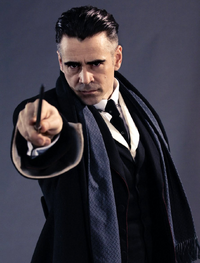
Grindelwald was sufficiently adept at human transfiguration to transform himself into a replica of Percival Graves
- Charms: Grindelwald was extremely skilled in charms. Albus Dumbledore claimed that when he was still seventeen, Grindelwald could already cast a Disillusionment Charm strong enough to effectively render himself invisible without needing to use an invisibility cloak, which is a tremondous feat. As such, the Cloak of Invisibility would be the Hallow that Grindelwald was least interested in, and continued his search for it only because the Cloak completed the trio of legendary artefacts. Grindelwald was also capable of casting an extremely powerful shield charm that can protect him from a barrage of spells fired at him by around twenty-four Aurors simultaneously with little effort.
- Healing magic: Grindelwald had a high understanding of healing charms, being able to heal the cuts on Credence Barebone's hands by simply touching them.
- Transfiguration: Grindelwald was exceptionally proficient in Transfiguration, even at the highest levels, such as Human Transfiguration. His skills in Human Transfiguration was sufficient to transform himself to assume the identity of Percival Graves for an extended period of time without raising suspicions.[19]
- Apparition: Like most adult wizards, Grindelwald was able to Apparate. However, he is capable of Apparating with great speed and precision, allowing him to avoid the violent attacks of Credence's Obscurus with relative ease.
- Occlumency: Grindelwald was an incredibly accomplished Occlumens, being able to fully conceal his true thoughts from the exceptionally talented Legilimens Queenie Goldstein while in his Percival Graves disguise.[20] Even Lord Voldemort himself, who was reputed to be the most accomplished Legilimens alive, was unable to penetrate Grindelwald's mind to gain information in his search of the Elder Wand.
- History of Magic: Grindelwald had good knowledge of magical history and lore, especially the portions of it that pertained to powerful magical artefacts such as the Deathly Hallows and wandlore. For example, he knew that Ignotus Peverell, owner of the Cloak of Invisibility, had been laid to rest in Godric's Hollow. He also was aware that in order to become the master of the Elder Wand, he needed to not only steal it, but he also had to defeat it's previous owner.
- Divination: Grindelwald was a Seer.[21] He had a vision about the existence of a powerful Obscurial linked to Credence Barebone. However, he is not an expert in this magical field, as Grindelwald initially misinterpreted the vision, believing that Credence would lead him to the child while in fact, Credence was the Obscurial himself. It should be noted, however, that Credence is the only known Obscurial ever to have lived past the age of 10, so Grindelwald could possibly not have anticipated this.
- Wandless and Nonverbal magic: Grindelwald was incredibly skilled in both wandless and nonverbal magic, either of which is advanced and often difficult to perform even individually, making Grindelwald's prowess all the more impressive, as he usually performed both simultaneously. In 1926, Grindelwald Summoned Newton Scamander's wand and suitcase over to him, both with a silent wave of his hand. Grindelwald also wandlessly lifted Newt Scamander from the ground from across the room and then made him, Porpentina Goldstein and Jacob Kowalski simultaneously drop to their knees with their arms locked behind against their backs. When he interrogated Newt soon thereafter, he Summoned the protective orb containing an Obscurus by silently gesturing it forth. He later saved the life of Credence Barebone from an oncoming train in the New York City Subway by hurling him sideways off the tracks with a wave of his wand. He was even able to send an automobile flying across a street at Tina Goldstein with a silent wave of his hand. By using only silent hand gestures, he generated forceful shockwaves to move and otherwise exert force on people and objects. He was able to break apart the ground by sending a shockwave rippling through it, notably performing this on the train tracks Newt Scamander was standing on to knock him down. Grindelwald later fended off around twenty Aurors simultaneously without speaking a single incantation. Grindelwald also healed the cuts on Credence's hand by silently running his own over it.
Possessions
- Gellert Grindelwald's wand: Grindelwald's original wand, notably used by him to permanently carve the Deathly Hallows symbol into the wall of Durmstrang Institute, and later used in the three-way duel between himself, Albus and Aberforth. Grindelwald's last known use of his wand was to stun Gregorovitch and attain mastery over the legendary Elder Wand.
- Percival Graves's wand: While infiltrating the MACUSA in the guise of Percival Graves, Grindelwald wielded Graves' wand.
- Elder Wand: Grindelwald wielded this wand, the most powerful wand in existence, known also as the "Wand of Destiny" or the "Deathstick", and one of the Deathly Hallows. He attained mastery of it after stunning Gregorovitch, but Grindelwald ultimately lost it at the end of his legendary duel with Albus Dumbledore.
- Gellert Grindelwald's necklace: Grindelwald possessed a necklace with a pendant of the Deathly Hallows sign, which Grindelwald gave to Credence Barebone, who could summon Grindelwald by touching it.
Relationships
Albus Dumbledore
- "Did I know, in my heart of hearts, what Gellert Grindelwald was? I think I did, but I closed my eyes."
- — Albus Dumbledore to Harry Potter, about his friendship with Gellert Grindelwald[src]
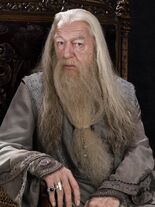
Albus Dumbledore first met Grindelwald when he was seventeen. They were introduced by Grindelwald's great aunt, Bathilda Bagshot. They got along almost instantly, according to Bagshot. They had much in common, including the quest for the Deathly Hallows and edgy ideals about the structure of a wizard-led society. Dumbledore's romantic feelings towards Grindelwald went most likely unrequited, but their friendship was nonetheless very close. Grindelwald may have sensed that the depth of his friend's affection for him could be used to monopolise his attention and used to achieve his goals.[17] They were very close for two months, making plans to find the Deathly Hallows and lead a wizarding revolution, but Albus neglected his younger siblings, Aberforth and Ariana, as a result. When Aberforth confronted the pair over this, Grindelwald lost his temper and attacked Aberforth. Albus rushed forward to defend his brother, and during the duel Ariana was killed. Grindelwald fled, his friendship with Albus over.
Over the next few decades, Grindelwald caused considerable havoc on behalf of his revolution and Dumbledore refused to face him out of fear that Grindelwald knew who had really killed Ariana. Grindelwald himself also seemed to fear the idea of facing Dumbledore, as he never attacked Britain, likely as he recognised that Dumbledore may defeat him if they duel. Eventually, however, Dumbledore could no longer stand idle with his former friend becoming an increasing source of terror on the continent. In 1945, Grindelwald combated Dumbledore for a second time in a legendary duel, said by eyewitnesses to be the greatest duel ever fought between wizards. Altough Grindelwald put up an immense fight, Dumbledore ultimately overpowered Grindelwald despite Grindelwald being the master of the Elder Wand during their duel, and imprisoned Grindelwald in his own prison, Nurmengard.
Many years later, in 1998, Grindelwald refused to give any information to Lord Voldemort about the Elder Wand despite the fact that he was imprisoned, wandless, and face-to-face with the only Dark Wizard ever considered more powerful than himself. This seems to indicate that Grindelwald no longer held the views of those who practised the Dark Arts and had felt remorse for his actions. It was speculated by Harry Potter that Grindelwald had given his life to prevent Voldemort from desecrating Dumbledore's tomb, perhaps indicating that despite all that happened, Grindelwald still retained some care and respect for his old friend.
Aberforth Dumbledore
Aberforth disliked Grindelwald immensely, as he was Albus's friend after Hogwarts. While Aberforth was taking care of Ariana, Albus and Grindelwald were planning to enslave the Muggles. As the two boys were planning to travel around the world, they also planned to take Ariana with them. Aberforth opposed them, telling them that he would be able to take care of Ariana once more. Grindelwald became very angry and used the Cruciatus Curse on Aberforth; Albus then defended his brother and the three boys had a duel, in which Ariana was accidentally killed. Grindelwald escaped and left the country. Aberforth retained bitter memories towards Grindelwald for many years after their fateful encounter, and when he recounted the events that led to his sister's death Harry noted the "positively dangerous" look that came over his face when Grindelwald's name was mentioned.[18]
Lord Voldemort
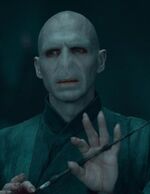
It's unknown if the two met prior, however by the time Voldemort visited Grindelwald in his Nurmengard prison in 1998, Grindelwald seemed to know all about him and claimed that he knew that Voldemort would one day visit him to seek out the Elder Wand. Despite Grindelwald's smugness and status as a once great Dark Wizard, Voldemort treated him as merely another person to interrogate in his search for the wand. Grindelwald likewise showed no fear toward the Dark Lord and laughed scornfully challenging Voldemort to kill him, much to the latter's fury. Grindelwald refused to tell Voldemort ther Elder Wand's location. He also told him that he will never be able to master it. Voldemort killed Grindelwald, furious at his inability to gain information from the former master of the Elder Wand.
Newton Scamander

Grindelwald interrogates Scamander in the guise of Percival Graves
Grindelwald, while disguised as Percival Graves, met the gifted Magizoologist in New York in 1926. Grindelwald expressed interest in why Dumbledore would be fond of Newt, but ultimately did everything in his power to have Newt take the blame for the Obscurial deaths and nearly had him executed. Grindelwald also revealed to Tina Goldstein that Newt had been expelled from Hogwarts for nearly killing a student in an incident involving a magical beast. When Newt intervened in Grindelwald's plan to acquire Credence Barebone, Grindelwald dropped all pretence and attempted to kill Newt, duelling with him ferociously, even torturing Newt with lightning spells. Newt managed to capture Grindelwald by use of Swooping Evil and revealed his true identity to MACUSA, but before being carried off Grindelwald turned to Newt and said mysteriously "Will we die, just a little?"
Credence Barebone
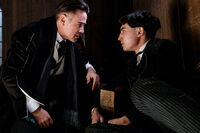
Grindelwald manipulated Credence Barebone during his search for the Obscurus
Grindelwald used Credence to try and locate the Obscurial and tossed him aside when he thought he had obtained his goal (assuming he was a Squib). When it was revealed that Credence was the Obscurial, Grindelwald tried to use him to expose the North American wizarding community, and create a weapon against Dumbledore. He continued to attempt to recruit Credence until he vanished after being attacked by many Aurors.
Etymology
- Gellert is the Hungarian version of Gerard, which comes from the Germanic ger, "spear", as well as hard, "brave, hardy". Saint Gellert was an Italian-born missionary and martyr who worked in Hungary.[22]
- Gellért Hill is a high hill overlooking the Danube in Budapest, Hungary. Gellért Hill was named after Saint Gerard who was thrown to death from the hill. The famous Hotel Gellért and the Gellért Baths can be found in Gellért Square at the foot of the hill. The Gellért Hill Cave is located within the hill, facing toward Hotel Gellért and the Danube River.
- Grindel is old German for "bolt," and is also similar to the mythic monster Grendel who was defeated by Beowulf. This forms a parallel with Albus Dumbledore, whose middle name is "Wulfric". Wald is German for "forest". Grindelwald is also the name of a ski resort in Switzerland.
- It is of interesting but purely speculative note that the name Gellert is very close to the name Gelert, the name of a legendary dog of cultural, but little historical, significance to Northern Wales. According to local mythology, Gelert was the most faithful companion of Prince Llewelyn, mistaken for the assailant of the prince's infant heir. His "grave" is a site in Beddgelert (literally Gelert's Grave), Gwynedd, as well as the legend is popular in the area.
- In German, wald is "forest." Grind is a scab, as in the hardened covering over a scar, could also be grinsen, a grin or big smile. The words grindel or grendel appeared in early versions of several Germanic languages, including English. Grindan in Old English meant "to grind," and further "destroyer," someone who grinds up others. In Middle English, grindel meant "angry." In Old Norse, grindill was taken from "storm," and also meant "to bellow," or produce a loud, frightening yell. In Danish legend, the Grendel was a fearsome, murderous monster of humanoid form. He was later defeated by the Scandinavian hero Beowulf in the medieval story of the same name.
Behind the scenes

Grindelwald as he appears in LEGO Dimensions
- Grindelwald is portrayed by Johnny Depp in the first and second instalment of the Fantastic Beasts film series. Since Grindelwald spends most of the first film disguised as Percival Graves, Colin Farrell portrays him in those scenes.
- A younger Gellert (in his teenage years) will appear in the second film of the Fantastic Beasts series.[23]
- British actor Jamie Campbell Bower portrays the young Gellert Grindelwald in the film adaptations of Harry Potter and the Deathly Hallows,[24] whereas Michael Byrne portrays the character as an old man.[25]
- While Grindelwald is described as being blue eyed in the fantastic beast screenplay the film shows him to have Heterochromia iridium (his right eye being light blue or grey, and his left eye being dark, possibly black).[3]
- This was not seen in the original film series when Grindelwald was shown in his youth or when he was elderly. As such, it is unknown if this is a retcon, or if his eyes changed sometime after his acquirement of the Elder Wand and returned to normal at a later point.
- In Fantastic Beasts and Where to Find Them, Grindelwald sports an undercut hairstyle, which was standard for members of the Hitler Youth.
- Additionally, he was described as being blond-haired and blue-eyed, iconic traits of the "Master Race" of the Nazi Regime.
- In a 2005 interview around the same time Harry Potter and the Half-Blood Prince was published, Rowling stated that it was not a coincidence that he was defeated in 1945, hinting at a connection with Adolf Hitler and at least the European front of World War II[26]. Grindelwald seems to be the wizarding version of Adolf Hitler. As referenced by Rowling, the date of Grindelwald's duel with Dumbledore coincides with the downfall of Nazi Germany. There are other similarities as well. Grindelwald adopted an ancient symbol as his sigil (the symbol of the Deathly Hallows) just as the Nazis adopted the swastika, an ancient symbol, switching its facing to create the Nazi swastika. Furthermore, the prison Nurmengard shares a similar name to the Franconian city of Nuremberg, where war criminal trials of former Nazis were held. Nurmengard's dual role as prison to both the victims and later the perpetrator may be a reference to Nuremberg's dual significance in World War II, which, aside from being the site of the Nuremberg Trials, was also the site of the proposal and adoption of the Nuremberg Laws, infamous discriminatory laws against Jewish people. Nurmengard also bears a sign that reads "For the Greater Good", which may correspond to the infamous "Arbeit Macht Frei" sign (German for "Work Makes [One] Free") which hung above the entrance to Auschwitz. Grindelwald's eventual sole imprisonment in his own prison is possibly a reference to the fate of Rudolf Hess, who from 1966 until his death in 1987 was the sole prisoner of Spandau prison. But the reader should beware imagining too close of a connection, as J.K Rowling probably used Muggle history as a jumping off point for her imagined Wizarding history but didn't intend to create a deep, multi-layered metaphor and instead chose to go in her own direction.
- It was revealed by J. K. Rowling during a tour in 2007 that Albus Dumbledore was homosexual, and harboured romantic feelings for Grindelwald[27]. Although she did not initially comment on Grindelwald's sexuality, Rowling later clarified that although Grindelwald was aware of Dumbledore's feelings, he merely used them to manipulate the other boy and did not reciprocate romantically.[17]

A vinyl figurine of Grindelwald produced by Funko Pop
- In a 2005 interview around the same time Harry Potter and the Half-Blood Prince was published, Rowling stated that Grindelwald was dead[28]. However, it was revealed in Harry Potter and the Deathly Hallows that he was still alive and imprisoned in Nurmengard. This would indicate that Grindelwald's inclusion in the novel was a late decision.
- In the film adaptation of Harry Potter and the Deathly Hallows, Grindelwald's historical significance is not explained in the slightest. Also, it appears that Voldemort doesn't kill Grindelwald, but simply leaves the prison room. It isn't made clear whether he killed him or not in the film.
- He also willingly tells Voldemort where the Elder Wand is.
- He also addresses Voldemort by his true name, "Tom," indicating some past history with him, or at least knowledge of his origins.
- Grindelwald was the first known Durmstrang student introduced in canon, although the fact that he attended Durmstrang was only revealed in Harry Potter and the Deathly Hallows.
- Aside from Harry Potter, Grindelwald is the only character who is mentioned by name in a title of the wizarding world franchise.
Appearances
- Harry Potter and the Philosopher's Stone (Mentioned on a Famous Wizard Card)
- Harry Potter and the Philosopher's Stone (film) (Name seen on Chocolate Frog Cards) (Mentioned in deleted scene)
- Harry Potter and the Philosopher's Stone (video game) (Mentioned on a Famous Wizard Card)
- Harry Potter and the Chamber of Secrets (video game) (Mentioned on a Famous Wizard Card)
- Harry Potter and the Deathly Hallows (First appearance) (Appears in photographs) (Appears in vision(s))
- Harry Potter and the Deathly Hallows: Part 1 (Appears in photographs) (Appears in vision(s))
- Harry Potter and the Deathly Hallows: Part 1 (video game) (Appears in vision(s))
- LEGO Harry Potter: Years 5-7[29]
- LEGO Dimensions[30]
- Pottermore (Mentioned on a Famous Wizard Card)
- Fantastic Beasts and Where to Find Them (mentioned in 2017 edition)
- Fantastic Beasts and Where to Find Them (film)
- Fantastic Beasts and Where to Find Them: The Original Screenplay
- Fantastic Beasts: The Crimes of Grindelwald
- Fantastic Beasts and Where to Find Them (Mentioned in forward of 2017 edition)
- Harry Potter: Hogwarts Mystery (mentioned only)
See also
Notes and references
- ↑ 1.0 1.1 In Harry Potter and the Deathly Hallows, Chapter 18 (The Life and Lies of Albus Dumbledore), Rita Skeeter says Grindelwald was expelled from Durmstrang at age sixteen, and it was not much time after that that he travelled to Godric's Hollow where he met Albus Dumbledore. This happened in the summer of 1899, immediately after Dumbledore graduated from Hogwarts.
- ↑ Durmstrang does not admit Muggle-born students, and he has a witch for a great aunt.
- ↑ 3.0 3.1 3.2 Fantastic Beasts and Where to Find Them (film)
- ↑ 4.0 4.1 4.2 Fantastic Beasts and Where to Find Them: The Original Screenplay, Scene 116 - "Graves transforms. He is no longer dark, but blond and blue-eyed"
- ↑ Harry Potter and the Deathly Hallows: Part 1
- ↑ 6.0 6.1 Fantastic Beasts and Where to Find Them (film trilogy) (see this image) Cite error: Invalid
<ref>tag; name "FB" defined multiple times with different content - ↑ Harry Potter and the Deathly Hallows, Chapter 18 (The Life and Lies of Albus Dumbledore) - "The very same summer that Dumbledore went home to Godric’s Hollow, now an orphan and head of the family, Bathilda Bagshot agreed to accept into her home her great-nephew, Gellert Grindelwald."
- ↑ Harry Potter and the Deathly Hallows, Chapter 18 (The Life and Lies of Albus Dumbledore) - letter from Albus to Gellert
- ↑ Harry Potter and the Deathly Hallows, Chapter 35 (King's Cross)
- ↑ Harry Potter and the Deathly Hallows, Chapter 24 (The Wandmaker)
- ↑ 11.0 11.1 11.2 11.3 Harry Potter and the Deathly Hallows, Chapter 35 (King's Cross)
- ↑ Fantastic Beasts and Where to Find Them (film) (see this image)
- ↑ https://www.pottermore.com/news/dumbledore-and-newt-will-team-up-against-grindelwald-in-the-next-fantastic-beasts-film
- ↑ Harry Potter and the Deathly Hallows, Chapter 23 (Malfoy Manor)
- ↑ Harry Potter and the Deathly Hallows, Chapter 14 (The Thief)
- ↑ 16.0 16.1 16.2 16.3 Harry Potter and the Deathly Hallows, Chapter 18 (The Life and Lies of Albus Dumbledore)
- ↑ 17.0 17.1 17.2 "Daily News"
- ↑ 18.0 18.1 Harry Potter and the Deathly Hallows, Chapter 28 (The Missing Mirror)
- ↑ JK Rowling FAQs - 5. Why did ‘revelio’ undo the effects of Polyjuice Potion?
It didn’t. Grindelwald’s Transfiguration surpasses that of most wizards, so he used a spell, not a potion, to take on the appearance of Percival Graves. - ↑ https://twitter.com/jk_rowling/status/809361237054201856
- ↑ https://twitter.com/jk_rowling/status/810753569808875520
- ↑ Behind the Name: Gellert
- ↑ https://www.pottermore.com/news/open-casting-call-for-young-people-announced-for-fantastic-beasts-and-where-to-find-them-sequel
- ↑ Jamie's a bachelor of (dark) arts
- ↑ http://www.imdb.com/title/tt0926084/fullcredits#cast
- ↑ "The Leaky Cauldron and Mugglenet interview Joanne Kathleen Rowling: Part Three," The Leaky Cauldron 16 July2005
- ↑ "Is Dumbledore Gay? Depends on Definitions of ‘Is’ and ‘Gay’"
- ↑ "The Leaky Cauldron and Mugglenet interview Joanne Kathleen Rowling: Part Three," The Leaky Cauldron 16 July 2005
- ↑ http://www.youtube.com/watch?v=NRScRfkKuXY
- ↑ Youtube - LEGO Dimensions: Fantastic Beasts Story Pack - Updated Ending
| Elder Wand | |||
| Death (manufacturer) · Antioch Peverell · Antioch Peverell's killer · Emeric the Evil · Egbert the Egregious · Godelot · Hereward · Barnabas Deverill · Loxias · Arcus or Livius · Mykew Gregorovitch · Gellert Grindelwald · Albus Dumbledore · Draco Malfoy (master only) · Tom Riddle (owner only) · Harry Potter · (Interred) | |||
| Resurrection Stone | |||
| Death (manufacturer) · Cadmus Peverell · (generations of Gaunts) · Marvolo Gaunt · Morfin Gaunt · Tom Riddle · Albus Dumbledore · Harry Potter · (Lost) | |||
| Cloak of Invisibility | |||
| Death (manufacturer) · Ignotus Peverell · Ignotus Peverell's son · Iolanthe Potter · (generations of Potters) · Henry Potter · Fleamont Potter · James Potter I · Albus Dumbledore (owner only) · Harry Potter · James Potter II · Albus Potter | |||

